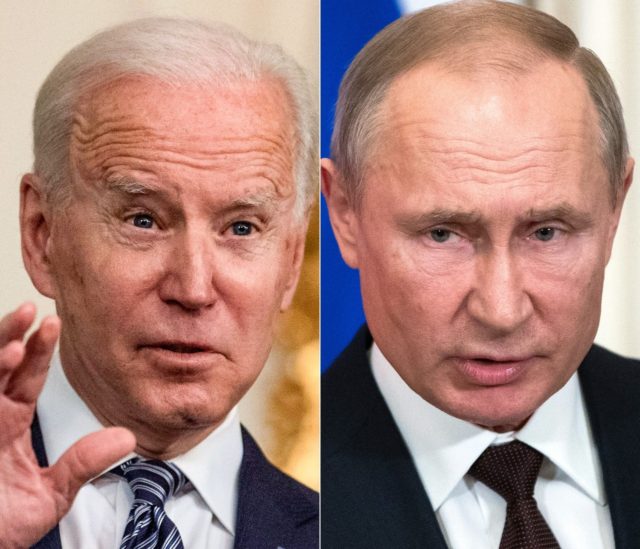Ukrainian President Volodymyr Zelensky announced on Tuesday that he was reviewing a request from his diplomats to cut all ties to Russia in response to Russian leader Vladimir Putin recognizing Russian proxies in the country as sovereign states and ordering “peacekeeping” troops into Ukraine.
Russia invaded Ukraine in 2014, colonizing its southern Crimea region and investing heavily, evidence suggests, in pro-Russian separatists in the Donbas region. Russia openly considers Crimea part of its sovereign territory but has previously denied being involved in Donbas. On Monday, Putin announced that he would recognize the two regions that together comprise Donbas, Donetsk and Luhansk, as sovereign states, and honor a request from their “governments” for Russian military support against Ukraine.
In an extensive, meandering speech, Putin repeatedly declared that Ukraine had no right to exist, was a Russian fabrication, and owed its existence entirely to Vladimir Lenin.
Putin made the move after President Joe Biden suggested in remarks to reporters in January that America would not intervene in the event that Putin engaged in a “minor incursion” of Ukraine. Following Putin’s speech, a senior administration official appeared to confirm that the Biden administration considered the move into Donbas a “minor incursion,” as “Russian troops moving into Donbas would not itself be a new step” that would trigger the full range of sanctions Biden had promised in January against any renewed Russian invasion.
Zelensky, who had expressed extreme exasperation with warnings from the White House for the past month of an “imminent” invasion of the entirety of Ukraine, had hinted in remarks this weekend that he believed Kyiv should consider building a nuclear weapons program. The country had abandoned all nuclear ambitions in 1994, signing the Budapest Memorandum that issued security guarantees from the West – meaning Western countries would fill in the defense gap left by Ukraine destroying its nuclear weapons – in exchange for Kyiv agreeing not to pursue nuclear weapons development.
“We see an attack on the sovereignty and territorial integrity of our state. I received a request from the Foreign Ministry to consider the issue of severing diplomatic relations between Ukraine and Russia,” Zelensky said on Tuesday. “Immediately after the press conference, I will work on this and other issues.”
Zelensky nonetheless offered the Russian government an avenue for “dialogue” rather than escalating the ongoing proxy war into an open war between Russia and Ukraine.
“We understand all the risks. We are again calling on Russia to resolve these issues through dialogue, to sit down at the negotiating table,” the president said. “We are ready to meet at any venue. In recent months, we have held consultations with almost all the leaders of EU, US, UK, Germany, France, etc. and offered any format of dialogue where the Russian Federation would be present.”
“We received the answer and that answer came yesterday. Ukraine must respond to this by defending sovereignty and our state,” Zelensky concluded, according to the Ukrainian government news outlet Ukrinform.
Ukraine’s apparent exit from diplomacy with Russia in the event that Putin does not respond positively to Zelensky’s call for dialogue follows a threat from the Ukrainian president this weekend to withdraw from the Budapest framework that keeps Ukraine from obtaining nuclear weapons.
“Ukraine received security guarantees for abandoning the world’s third nuclear capability. We do not have those weapons. Nor do we have security,” Zelensky said in remarks to the Munich Security Conference.
“Since 2014, Ukraine has made three attempts to convene consultations with the guarantor states of the Budapest Memorandum. Three attempts failed. Today Ukraine will make the fourth attempt. And I will make my first attempt as the President,” Zelensky announced, “But both Ukraine and I are doing this for the last time.”
If the guarantors of the memorandum – the United Kingdom and America – fail to end the Russian colonization of Ukraine, Zelensky asserted, “Ukraine will have every right to believe that the Budapest Memorandum is not working and all the 1994 package decisions have been called into question,” indicating he would pursue nuclear development.
Nuclear energy is a contentious issue in Ukraine given its status as the home of history’s worst nuclear disaster: the meltdown of the Chernobyl Nuclear Power Plant on April 26, 1986. While much of the fallout spread north to Belarus, the Chernobyl Exclusion Zone, the greater area surrounding the plant, has been evacuated since the disaster. Since becoming president in 2019, however, Zelensky has been an active proponent of peaceful nuclear energy development, issuing a decree in 2020 to expand nuclear energy capabilities. Zelensky has also spearheaded efforts to attract tourism to Chernobyl, vowing a “renaissance” on the 35th anniversary of the disaster in 2021.
Putin’s speech on Monday directly addressed Zelensky’s threat.
“As we know, it has already been stated today that Ukraine intends to create its own nuclear weapons, and this is not just bragging,” Putin claimed. “Ukraine has the nuclear technologies created back in the Soviet times and delivery vehicles for such weapons, including aircraft, as well as the Soviet-designed Tochka-U precision tactical missiles with a range of over 100 kilometres. But they can do more; it is only a matter of time.”

COMMENTS
Please let us know if you're having issues with commenting.